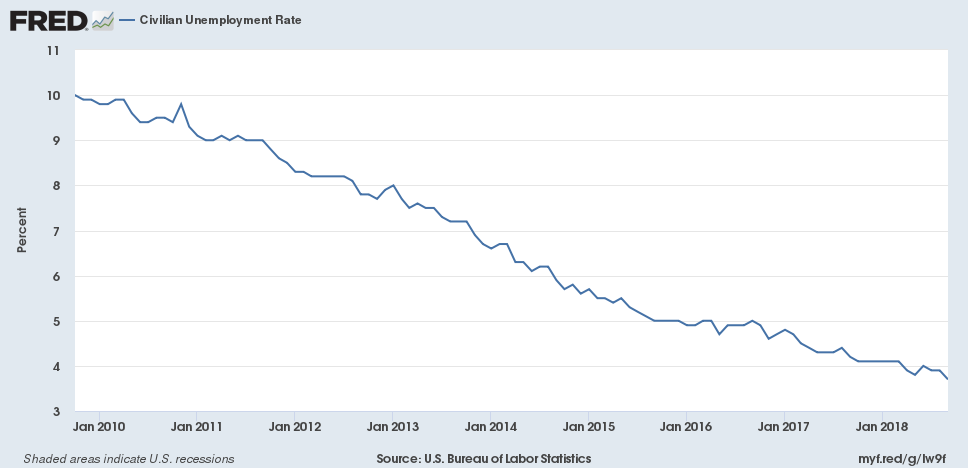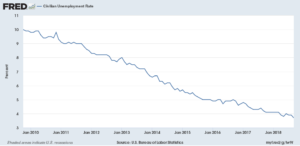

Reality is not easy to interpret and understand, even with good theories. It becomes even more difficult when ideology–that is, moral values or political partisanship–interferes. Here I think is an example.
I tweeted a link to a Wall Street Journal story of October 5 titled “U.S. Unemployment Rate Falls to Lowest Level Since 1969,” with the subtitle “Nonfarm payrolls rose a seasonally adjusted 134,000 in September, the smallest gain in a year.” My only comment was a straight quote from the story:
“Employers added 134,000 jobs to payrolls, a record 96th straight month of gains. Wages rose 2.8% from a year earlier, a solid if still unspectacular rise.”
A regular critic of mine replied:
The tariffs are working their magic!
As the figure above shows, the unemployment rates has been falling quite regularly since October 2009. The new tariffs, mainly imposed in 2018, have not had an obvious impact on the trend.
Or perhaps my opponent was teasing and I am the one who needs to say “mea culpa.”

READER COMMENTS
Matthias Goergens
Oct 9 2018 at 6:02am
Tariffs and unemployment should be mostly independent of each other.
Free trade makes the economy more efficient end consumers (and most producers) better off.
Unemployment seems mostly a function of friction, employment-unfriendly regulation, and monetary policy errors (compounded by unfree banking and sticky prices).
Tariffs shouldn’t have too much of an impact one way or another. (Of course that’s spoken from the sane perspective that also says tariffs are stupid.)
Jon Murphy
Oct 9 2018 at 11:11am
Tariffs wouldn’t have an impact on the number of jobs anyway. Tariffs change the types of jobs created, but not the number. There are far more important factors that determine the size of the labor force, which determines the number of jobs.
Hamid
Oct 9 2018 at 11:34am
I think that if after imposing tariffs:
1. Unemployment continues to drop.
2. Wages continue to rise.
Then tariffs are not harmful for the U.S., they can be competitive with them.
They are maybe useful since they slow down the disruption of value chains.
Jon Murphy
Oct 9 2018 at 2:24pm
That doesn’t necessarily follow. Correlation does not equal causation and all that. it’s probable the positive forces of the economy outweigh the damage of the tariffs. Indeed, wages are dependant on productivity, not tariffs or trade (trade has no direct effect on wages), so whether wages rise or fall would not be an indication of tariffs’ effectiveness. Further, trade has no impact on the number of jobs, so that rules out that measurement as well.
But, let me make my case further by way of metaphor:
Imagine I am driving down the highway at 70 MPH. I simultaneously press the accelerator and brake peddle. My speed increases to 75MPH. Could we conclude, reasonably, breaks do not hinder forward momentum?
Pierre Lemieux
Oct 11 2018 at 5:05pm
Hamid: Jon is right. Another way to see this: you have to consider the economy as a system where things don’t always happen ceteris paribus. See my post of tomorrow on that.
Warren Platts
Oct 10 2018 at 7:36am
I was mostly teasing–it is too soon to judge the macroeconomic effects of the tariffs either way. That said, if employment is less than full, there is some reason to believe that tariffs could reduce unemployment and concentrate the effects of stimulus spending. Granted, unemployment is at historically low levels, but there is still an army of 42 million people aged 25-54 who are not in the labor force, many of whom could in principle be enticed to work if wages go up enough.
https://fred.stlouisfed.org/series/LREM25TTUSM156S
Jon Murphy
Oct 10 2018 at 8:12am
Unfortunately, tariffs (and trade in general) have zero effects on wages 9this has been empirically proven by Paul Krugman among many others). So, imposing tariffs would not induce people to work.
Further, there’s a more basic supply-and-demand error of your logic. Basic Econ 101: demand curves slope downward. It’s the reason why the minimum wage doesn’t work. More people may be willing to work, but given they are currently unemployable at the current wage rate, a higher wage will not make them more attractive.
And all this is ignoring public choice issues.
Warren Platts
Oct 10 2018 at 9:36am
Wrong on all counts. Here is Krugman on Samuelson’s tariff theory and wages:
And while it is the case that demand curves slope down, it is also the case that supply curves slope upward. Each point represents a person and the minimum wage at which they are willing to participate in the work force. Therefore, when wages go up, more people enter the labor force (the quantity of labor supplied goes up). A recent article by Michael Hicks entitled “We don’t have a labor shortage. We have a pay shortage” explains all this.
As for “public choice,” the mood among about 100 million members of the public regarding free trade is well encapsulated by an old article by John Maynard Keynes:
The last sentence is indeed the question. My advice to the economics professionals reading this is that if you want to remain relevant, then take the above sentiment seriously. We, the working class, want the trade deficit ended. If you do not want to use tariffs, then come up with a better idea, be it capital controls or currency devaluation. More of the same is not an answer. And do not tell us that trade deficits do not matter. From the streets of Youngstown, whether you realize it or not, that comes across as gaslighting, well, because it is. Otherwise, we shall simply have to see you at the ballot box, and we will let Trump and Navarro solve the problem.
Pierre Lemieux
Oct 11 2018 at 3:23pm
See my reply below.
Pierre Lemieux
Oct 11 2018 at 3:22pm
Warren: Thanks for clarifying the “mostly teasing” thing. I was only mostly responding too! Your objection contains some interesting points. However, following Keynes in such matters is risky, for it may lead you to follow Sanders as much as Trump and Navarro. More important, perhaps, it leads to many falsehoods, at least if one favors a free society. Much of today’s government failure is due to Keynes’s theories. Morever, the argument “We, the working class, want the trade deficit ended” seems even stranger (even assuming that you can talk with the collective mouth of the working class or the avant-garde of the proletariat). If “the working class”–by which I mean here the third of the electorate who voted for Trump–wants Juan Peron, flat earth, creationism, Alex Jones’s conspiracies about staged school shooting, or pre-Smithian economic hunches–it doesn’t mean that it is true.
Pierre Lemieux
Oct 12 2018 at 11:29am
Let’s not forget that 4% of Americans believe that lizzards control politics, and that most of these believers must have voted for Trump and believe that the trade deficit is a curse from the Devil.
Tom Crispin
Oct 12 2018 at 2:04pm
What’s more likely: that 4% of Americans believe lizards control politics, or that at least 4% of Americans enjoy fibbing to pollsters?
Warren Platts
Oct 12 2018 at 2:11pm
Hey George Soros does look rather reptilian tbqh! Be that as it may, let us say hypothetically that Trump fired Navarro and hired Pierre Lemieux in his place. In the first meeting, Trump gives Lemieux one job: devise a plan to unwind the trade deficit in the least disruptive manner, and it has to be done by 2020 or 2024.
Lemieux will obviously protest that the trade deficit is no big deal. But Trump would simply say “You are wrong. The base wants the trade deficit ended, so right or wrong, we have to make it happen.”
Honest question: What would be your advice?
Pierre Lemieux
Oct 12 2018 at 2:54pm
I would try, “You are wrong, Your Excellency.” If this did not work, I would say, “Your base (30% of the American electorate, at most) had no idea of what the trade deficit was, they probably even did not know the word, until you mentioned the word and mislead them. So if you love your country at least as much as Kim Jong Un (for you did say that ‘he loves his country very much’–I am quoting from memory, Your Excellency), you will explain them and tell them ‘le vrai temps qu’il fait sur la terre’ as Saint-Exupéry said.” If this still did not work, I would say, “Please go and read some books, starting from basic economics, history, and political philosophy.” Do you understand, Warren, why he only hires minions or ignorants? I dare think that I am neither one nor the other, so honestly, warren, I reject the assumption underlying your question that he would hire me!
Pierre Lemieux
Oct 12 2018 at 3:00pm
Or perhaps, Warren, after you talked me out of this advice, I would simply say to him, “You don’t have to establish the tyranny of the minority, Your Excellency. In fact, your oath of office forbids you from doing so.” And I would have him start his readings with something apparently simple, the Federalist Papers.
Comments are closed.